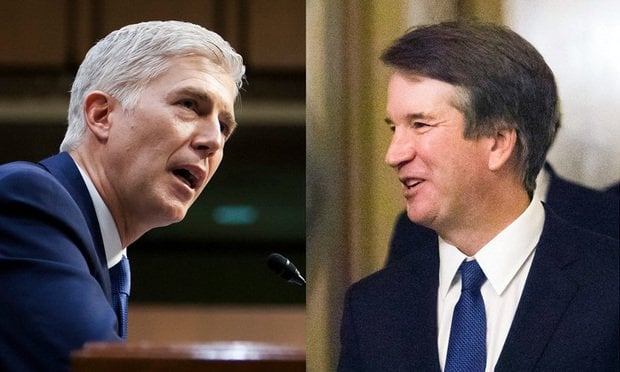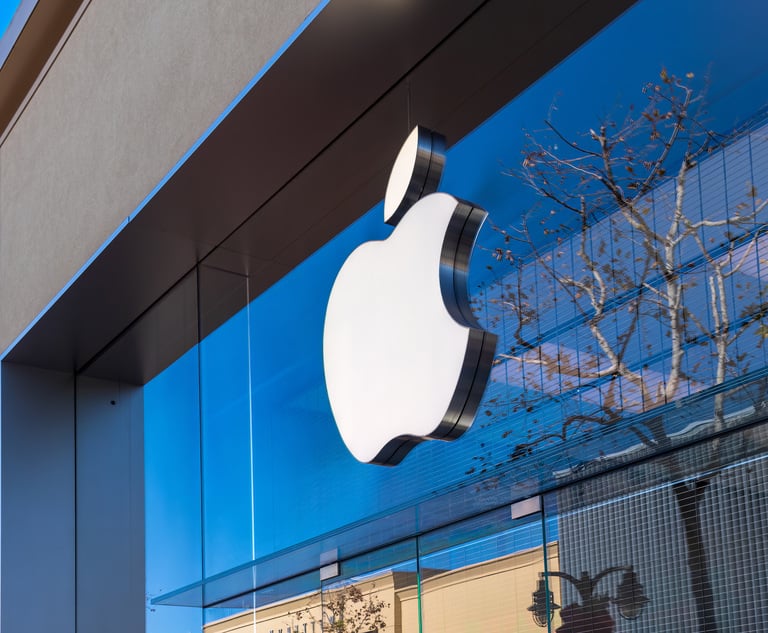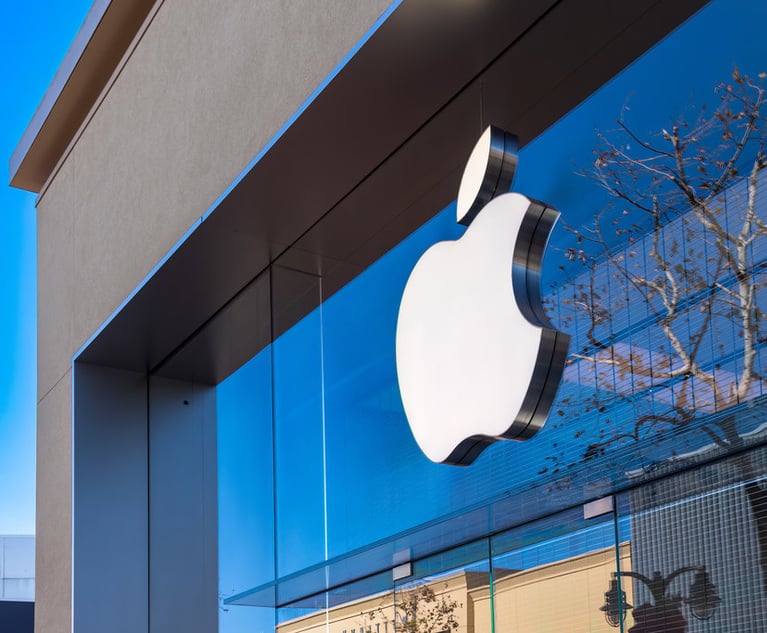Split Supreme Court Greenlights Antitrust Lawsuit Over Apple's App Store Prices
The majority decision, written by Justice Brett Kavanaugh, said the plaintiffs are direct purchasers who can sue Apple over the prices paid in its app store.
May 13, 2019 at 12:20 PM
3 minute read
 Justices Neil Gorsuch (left) and Brett Kavanaugh (Photos: Diego M. Radzinschi/ALM)
Justices Neil Gorsuch (left) and Brett Kavanaugh (Photos: Diego M. Radzinschi/ALM)
Apple must face an antitrust lawsuit brought by consumers who claim the Silicon Valley tech giant has a monopoly over its app store that allows it to overcharge customers.
Monday's majority decision from the U.S. Supreme Court, written by Justice Brett Kavanaugh, said the plaintiffs are direct purchasers under the court's Illinois Brick Co. v. Illinois decision, despite claims to the contrary by Apple. Monday's majority decision upholds a ruling from the U.S. Court of Appeals for the Ninth Circuit, which had overturned a district court.
Illinois Brick held that only the first buyer from an unlawful monopoly can claim treble damages under federal antitrust laws, even if an overcharge has been passed through to indirect or subsequent buyers.
The underlying consumer class action contends Apple's “wholly-owned, monopoly app store” overcharges for apps and distorts the market at the supply chain and at the retail chain.
“It is undisputed that the iPhone owners bought the apps directly from Apple,” Kavanaugh wrote. “Therefore, under Illinois Brick, the iPhone owners were direct purchasers who may sue Apple for alleged monopolization. That straightforward conclusion follows from the text of the antitrust laws and from our precedents.”
In rejecting Apple's argument that it's the app developers who set the price, the majority said the company's theory would provide a road map for monopolistic retailers or suppliers to evade antitrust claims.
“That restructuring would allow a monopolistic retailer to insulate itself from antitrust suits by consumers, even in situations where a monopolistic retailer is using its monopoly to charge higher-than-competitive prices to consumers,” Kavanaugh wrote. “We decline to green-light monopolistic retailers to exploit their market position in that way. We refuse to rubber-stamp such a blatant evasion of statutory text and judicial precedent.”
Justices Ruth Bader Ginsburg, Stephen Breyer, Sonia Sotomayor and Elena Kagan joined the majority.
Monday's decision, which did not address the merits of the underlying claims, came after the justices appeared skeptical of Apple's claims during oral arguments in November. Apple's lawyer, Latham & Watkins partner Daniel Wall, told the justices that, although Apple collects a 30 percent commission on each app, the app developers set the sales price. Apple is simply the distributor of the apps.
The only first buyer with standing to sue Apple, Wall argued, is the app developer who pays the 30% commission.
U.S. Solicitor General Noel Francisco supported Apple's position in the case, Apple v. Pepper.
In dissent, Justice Neil Gorsuch, joined by Justices Clarence Thomas and Samuel Alito and Chief Justice John Roberts, said the majority is recasting Illinois Brick to allow plaintiffs to sue Apple for passing on the cost imposed by developers.
“This replaces a rule of proximate cause and economic reality with an easily manipulated and formalistic rule of contractual privity,” Kavanaugh wrote. “That's not how antitrust law is supposed to work, and it's an uncharitable way of treating a precedent which—whatever its flaws—is far more sensible than the rule the Court installs in its place.”
David Frederick, a partner at Kellogg, Hansen, Todd, Figel & Frederick, had the winning argument for the consumer class.
This content has been archived. It is available through our partners, LexisNexis® and Bloomberg Law.
To view this content, please continue to their sites.
Not a Lexis Subscriber?
Subscribe Now
Not a Bloomberg Law Subscriber?
Subscribe Now
NOT FOR REPRINT
© 2025 ALM Global, LLC, All Rights Reserved. Request academic re-use from www.copyright.com. All other uses, submit a request to [email protected]. For more information visit Asset & Logo Licensing.
You Might Like
View All
California Court Denies Apple's Motion to Strike Allegations in Gender Bias Class Action

White & Case KOs Claims Against Voltage LLC in Solar Companies' Trade Dispute


'A Never-Ending Nightmare': Apple Sued for Alleged Failure to Protect Child Sexual Abuse Survivors
Trending Stories
- 1No Two Wildfires Alike: Lawyers Take Different Legal Strategies in California
- 2Poop-Themed Dog Toy OK as Parody, but Still Tarnished Jack Daniel’s Brand, Court Says
- 3Meet the New President of NY's Association of Trial Court Jurists
- 4Lawyers' Phones Are Ringing: What Should Employers Do If ICE Raids Their Business?
- 5Freshfields Hires Ex-SEC Corporate Finance Director in Silicon Valley
Who Got The Work
J. Brugh Lower of Gibbons has entered an appearance for industrial equipment supplier Devco Corporation in a pending trademark infringement lawsuit. The suit, accusing the defendant of selling knock-off Graco products, was filed Dec. 18 in New Jersey District Court by Rivkin Radler on behalf of Graco Inc. and Graco Minnesota. The case, assigned to U.S. District Judge Zahid N. Quraishi, is 3:24-cv-11294, Graco Inc. et al v. Devco Corporation.
Who Got The Work
Rebecca Maller-Stein and Kent A. Yalowitz of Arnold & Porter Kaye Scholer have entered their appearances for Hanaco Venture Capital and its executives, Lior Prosor and David Frankel, in a pending securities lawsuit. The action, filed on Dec. 24 in New York Southern District Court by Zell, Aron & Co. on behalf of Goldeneye Advisors, accuses the defendants of negligently and fraudulently managing the plaintiff's $1 million investment. The case, assigned to U.S. District Judge Vernon S. Broderick, is 1:24-cv-09918, Goldeneye Advisors, LLC v. Hanaco Venture Capital, Ltd. et al.
Who Got The Work
Attorneys from A&O Shearman has stepped in as defense counsel for Toronto-Dominion Bank and other defendants in a pending securities class action. The suit, filed Dec. 11 in New York Southern District Court by Bleichmar Fonti & Auld, accuses the defendants of concealing the bank's 'pervasive' deficiencies in regards to its compliance with the Bank Secrecy Act and the quality of its anti-money laundering controls. The case, assigned to U.S. District Judge Arun Subramanian, is 1:24-cv-09445, Gonzalez v. The Toronto-Dominion Bank et al.
Who Got The Work
Crown Castle International, a Pennsylvania company providing shared communications infrastructure, has turned to Luke D. Wolf of Gordon Rees Scully Mansukhani to fend off a pending breach-of-contract lawsuit. The court action, filed Nov. 25 in Michigan Eastern District Court by Hooper Hathaway PC on behalf of The Town Residences LLC, accuses Crown Castle of failing to transfer approximately $30,000 in utility payments from T-Mobile in breach of a roof-top lease and assignment agreement. The case, assigned to U.S. District Judge Susan K. Declercq, is 2:24-cv-13131, The Town Residences LLC v. T-Mobile US, Inc. et al.
Who Got The Work
Wilfred P. Coronato and Daniel M. Schwartz of McCarter & English have stepped in as defense counsel to Electrolux Home Products Inc. in a pending product liability lawsuit. The court action, filed Nov. 26 in New York Eastern District Court by Poulos Lopiccolo PC and Nagel Rice LLP on behalf of David Stern, alleges that the defendant's refrigerators’ drawers and shelving repeatedly break and fall apart within months after purchase. The case, assigned to U.S. District Judge Joan M. Azrack, is 2:24-cv-08204, Stern v. Electrolux Home Products, Inc.
Featured Firms
Law Offices of Gary Martin Hays & Associates, P.C.
(470) 294-1674
Law Offices of Mark E. Salomone
(857) 444-6468
Smith & Hassler
(713) 739-1250






